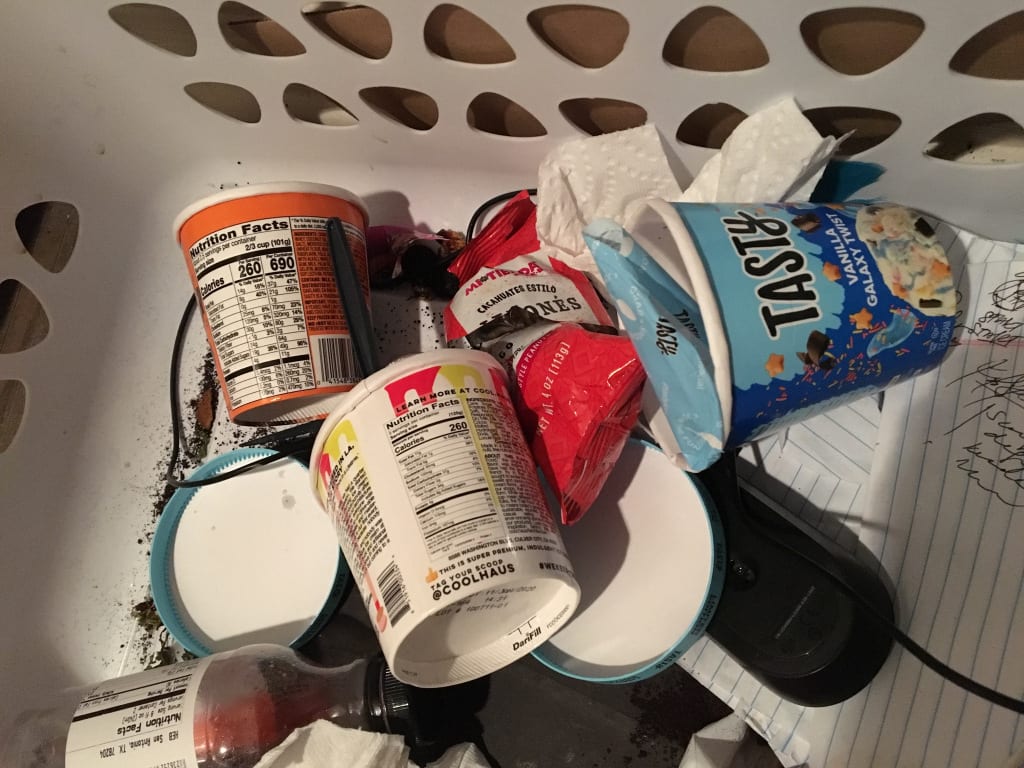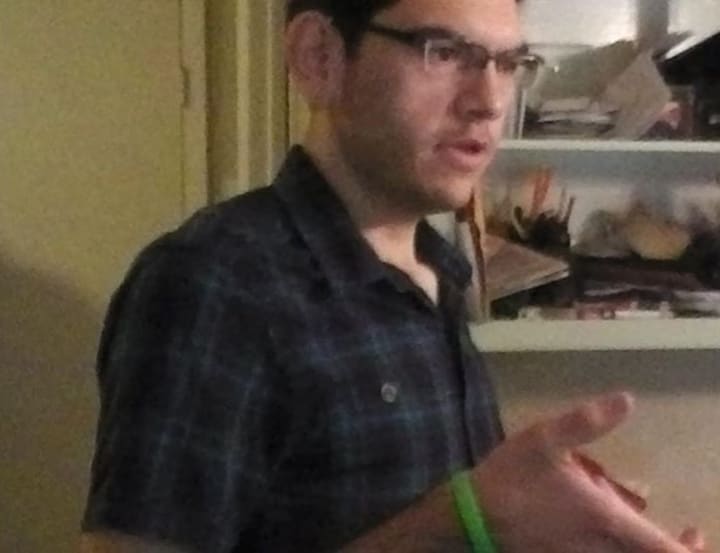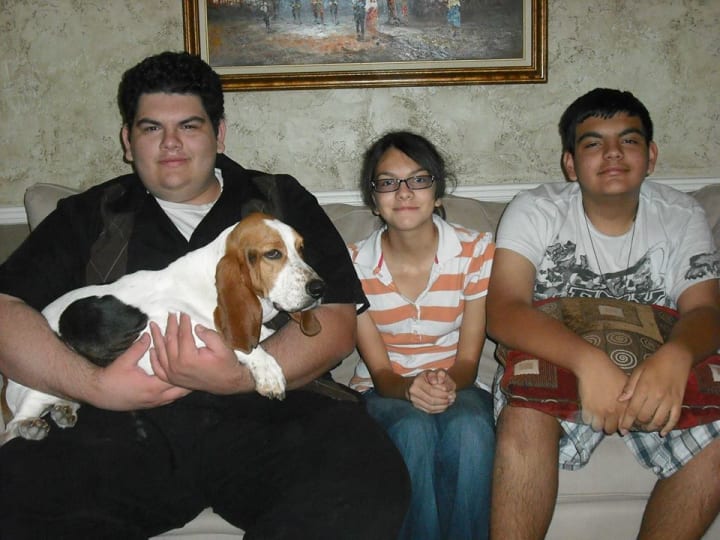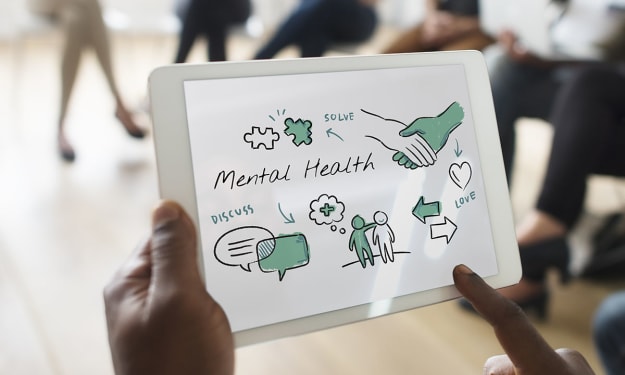Ending My Life-Long Yo-Yo Dieting by Addressing the Real Problem: What the Fitness Trainers and Diet Gurus Aren't Telling You
I was 430 pounds at age 21. Food addiction is a mental illness and, trust me, you MUST address it if you have ANY hope of your diet succeeding and being able to live a normal life.

That’s my laundry basket (although as I was re-arranging my apartment it was clearly more like an impromptu trash can). And those are the three pints of ice cream I bought in a split-second decision at the grocery store a few months ago — despite being well into a healthy eating and exercise plan.
Yep, I downed all three pints in a matter of minutes.
I took the picture because at the time, I thought I’d get a few likes on Instagram with some cheesy self-care caption.
Therapist: What do we tell ourselves when we binge three pints of ice cream on a Tuesday night?
Me: Hashtag self-care, hashtag YOLO?
Therapist: No.
I think the most laughable, terrible, no-good very-bad analogy I have for my moment of realization is to say that the icing on the cake was watching Aidy Bryant’s character Annie in the Hulu series Shrill get so raw and relatable when tearfully venting to her friends about the life lived fat. The endless cycle of diets, the cohesive hounding from society’s tastemakers to only accept skinny, the feeling of being trapped in a “mind prison” — with food as addictive for us as booze, cigs, and gambling can be for others.
There was a very eye-opening day back in 2013 — a few weeks after I finished losing 230 pounds in 1 year.
After the dozens of compliments I received about my story broadcast on local news, after the countless days exercising both morning and night, after the months of only consuming 1,200-1,400 calories a day — after all of that, I was at my parents’ house one night… and I just snapped. I binged. I tore through that kitchen, ripping through boxes and bags of food, and pawing my way through shelves in the fridge. I remember downing sandwiches, cereals, crackers, peanut butter — anything I could get my hands on. Any carbs I could get my hands on.

And while I was whizzing back and forth between the living room and the kitchen (eating a plate of food in front of the TV and getting more during commercial breaks), I felt this feeling throughout my body and my mind as if there was no way I could stop this. I felt powerless in a trance — and this continued until I was uncomfortably full and couldn’t take another bite.
For quite a while, I thought that moment was the first time I had ever experienced such a sensation.
But I was wrong. It was just the first time I had mindlessly binged since losing all of that weight.
There was a moment when I was at grandma’s house as a kid: I opened the pantry, got a brand-new box of Little Debbie Oatmeal Creme Pies and ate every single one in a matter of minutes. Have you ever seen one of those boxes?! There are a dozen snack pies in there! I ate every single one.
Now, that was sometime between 2000-2002.
And here we are today in 2019, where I’ve had countless binge sessions just this past month involving Domino’s, Jack in the Box, junk food at work, and more. I’m so angry and can hear my fingers slam more aggressively at each key on the keyboard right now, echoing in the coffeeshop. I know I don’t like any of this crap I’m stuffing in my mouth.
But no matter how many times I master the art of the ol’ “getting back on track” schtick, it’s just a matter of time until the relapse — it always has been.
(Spoiler alert: I’ve gained quite a bit of that “200 pounds” back since that story aired in six years ago… nearly 150 pounds if you were wondering.)
I had the first successful weight-loss effort in high school: Lost 15 pounds exercising at the Y and eating more nutritious meals. By the time I entered 10th grade, I fit comfortably into 2XL shirts again (remember, I was only 15 years old!) and I squeezed into those overpriced khaki cargo shorts from American Eagle.
But the weight came back, and more ferocious than ever.
By the time I graduated high school at 18 years old, I was a solid 3XL and deep into the 300-pound range.


By 21 years old? My peak: 430 pounds.
I bought a scale specifically with a 500-pound capacity and weighed myself at 21 — but months would pass before I started my most successful weight plan of losing 200 pounds.
So, honestly, sure, 430Pounds.com is my brand, but the likelihood is that I was much heavier than that.
Since losing 200 pounds, I’ve fluctuated so damn much it’s ridiculous.
I have three closets filled with clothes, yet I can only wear a fraction of them at a time. I don’t get rid of anything because who knows where I’ll be in 3, 6, 9, 12 months.
And do you know what made the food addiction worse?
Outside factors:
- A break-up.
- Working a job I hated… in an industry I came to really freakin’ hate.
- And just this constant feeling as if I was in a fog all of the time, unclear of my direction in life, with no real motivation to do anything.
So, you may notice a pattern here, and the strong correlation between mental health and physical health.
Without one, you don’t have the other.
And that’s what we’re going to focus on this time around.
It’s what I’ve been focusing on — in solitude, with friends, with family, and with professionals.
Michelle Moore, a state-licensed mental health counselor in Orlando and past-president of the Central Florida chapter of the International Association of Eating Disorders Professionals Foundation, says food disorders are “a life-threatening mental illness with medical consequences."
We’ll be talking to Moore at a later point — as we will so many other professionals and individuals bravely ready to overcome and achieve.
The solutions and pathways for conquering this mental illness are more complex — so much more complex — than just diet and exercise.
They are tailor made for every individual’s battle. They are not universal.
By one estimate, more than 70 million Americans are addicted to food, and that number is rising.
Roughly half of the obese population is categorized as having a food addiction. That statistic may not be so alarming, but listen to this: 30% of “overweight” people and 20% of “healthy weight” people are in that same category of having an addiction to food.
For me, this is the beginning of a much clearer look at not just the problems — but the solutions.
And I hope this journey provides a clearer solution for you, as well.
LFG. Let’s fucking go.
1 – Dr. David Kessler, former commissioner of the U.S. Food and Drug Administration.






Comments
There are no comments for this story
Be the first to respond and start the conversation.